- Can You Get Vitamin D on a Cloudy Day? An Outdoors Guide
- Can You Get Vitamin D on a Cloudy Day? And How Do You Get Vitamin D From the Sun?
- What Is Vitamin D? How Much Vitamin D Do You Need Daily?
- What Are the Benefits of Vitamin D for Your Health?
- What Are the Benefits of Vitamin D for Your Skin?
- Can You Get Vitamin D on a Cloudy Day? Yes, but What Other Factors Affect Your Vitamin D Levels?
- 5 Ways You Can Get Vitamin D (Aside From the Sun)
- 8 Foods Rich in Vitamin D to Add to Your Diet
- Vitamin D Deficiency: Symptoms and Quick Facts to Know
- Can You Get Vitamin D on a Cloudy Day? Yes, So Experience the Great Outdoors Confidently with MOX

Can you get vitamin D on a cloudy day? The answer is simple – yes, you can. While clouds seem like the ultimate D-blocker (get your mind out of the gutter; we’re talking about vitamin D, man), your body will produce it naturally as sunlight can still penetrate through cloud cover. But why and how does your body make vitamin D, and should you eat a hearty diet with lots of it?
We know the word “penetrate” is a no-go on a men’s blog but we had to get your attention. Now, let’s explore “Can you get vitamin D on a cloudy day?” in-depth:
Warning: There are going to be a lot of D jokes in our most sus blog to date.
Can You Get Vitamin D on a Cloudy Day? And How Do You Get Vitamin D From the Sun?
While we answered the question “Can you get vitamin D on a cloudy day?” above, let’s delve into how and why. You'll get vitamin D on cloudy days because, although the intensity of UV rays is weakened, they still have skin-damaging power. You may need to spend more time outside on a cloudy day to obtain the same amount of vitamin D as you would on a clear one.
Here's a detailed look at how and why you still produce vitamin D on cloudy days:
- UVB Radiation: Sunlight contains ultraviolet B (UVB) radiation, which is a type of radiation that stimulates vitamin D in your skin. While clouds can block some sunlight, they don't completely filter out UVB rays, allowing your skin to absorb them for the D.
- Reflection: Even on cloudy days, sunlight can reflect off surfaces like buildings, sidewalks, and snow, which can contribute to your overall exposure to UVB rays. This reflected sunlight can also help stimulate vitamin D synthesis in your skin and body.
MOX PROTIP: Many studies show that your skin and body are most efficient at making vitamin D at noon, so try to take a midday break outside for 5 to 30 minutes, even if it’s a cloudy day.
Video: Can you get vitamin D on a cloudy day? How long should you stay outside to get enough vitamin D? | Source: Dr. Eric Berg DC
What Is Vitamin D?
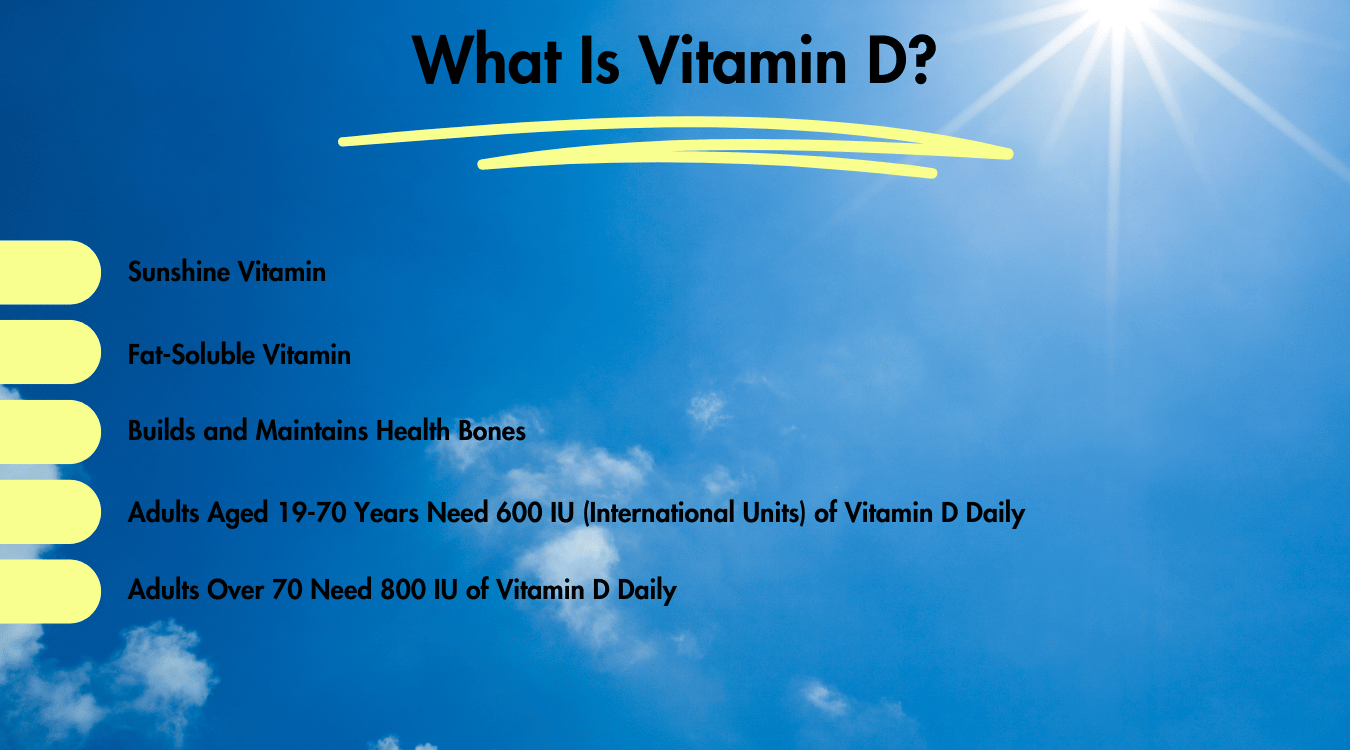
The two main forms of vitamin D are known as:
- Vitamin D2 (ergocalciferol): Mostly comes from plant-based sources and supplements
- Vitamin D3 (cholecalciferol): Produced by your skin when exposed to sunlight, but also comes from animal-based sources, skincare, and supplements
Here is how much vitamin D you need daily based on your age, according to Healthline (it’s measured in IU (International Units), which you can learn more about here):
- Infants (up to 12 months): 400 IU
- Children/Adolescents (1-18 years): Between 600 to 1,000 IU
- Adults (19-70 years): Between 600 to 800 IU
- Adults (70+ years): Between 800 to 1,000 IU
- Pregnant/Breastfeeding Women: Between 600 to 800 IU
MOX PROTIP: You need protection that still allows the D to penetrate your skin because you want a healthy, strong appearance, right? With the MOX Invisible Armor SPF 30, your skin will still produce vitamin D (even on a cloudy day), but it’ll also keep your skin sun damage-free. Balance is key, so make sure to get the D and use our sunscreen.
What Are the Benefits of Vitamin D for Your Health?
Now that you can answer a yes to the question of “Can you get vitamin D on a cloudy day?” let’s explore a few health benefits of vitamin D that are backed by science:
- Bone Health: Vitamin D helps regulate calcium and phosphorus absorption, which are minerals for keeping strong, healthy bones (we know – we sound like a Got Milk ad).
- Muscle Function: Vitamin D is involved in muscle function and strength by helping to improve muscle performance and reduce the risk of falls, particularly in older guys.
- Immune System Support: Vitamin D boosts your immune system and may help reduce the risk of infections, including respiratory ones like the common cold or flu.
- Heart Health: Some research suggests that adequate vitamin D levels may be associated with a reduced risk of cardiovascular disease and lower blood pressure.
- Mood Regulation: There is evidence to suggest that vitamin D may play a role in regulating mood and reducing the risk of depression.
- Cancer Prevention: Studies have suggested that sufficient vitamin D levels may be associated with a lower risk of certain cancers, including colorectal, breast, and more.
- Brain Health: Good vitamin D levels may be important for brain health and cognitive function as some studies have found a link between low vitamin D levels and dementia.
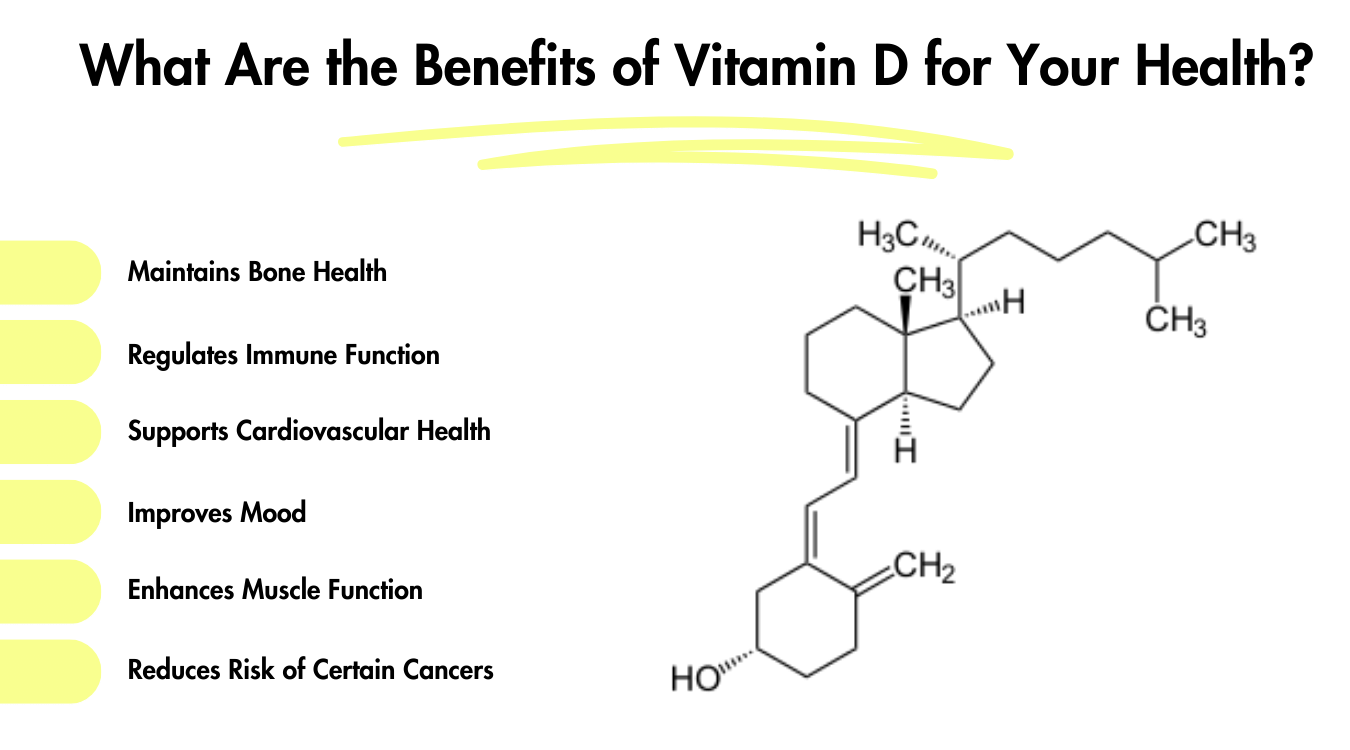
What Are the Benefits of Vitamin D for Your Skin?

MOX products contain high-quality, strengthening ingredients for your skin because – frankly – looking good matters. Pharmacist Ben, MOX’s formulator, uses vitamin D3 in the Multi Nutrient Serum to give you crazy good benefits. Check out what he has to say about vitamin D:
“Vitamin D helps your skin cells grow properly. It stabilizes the growth of your skin cells, which is why it's often used for healing purposes, and it works together with vitamin A. Vitamin D is a type of cholesterol, and when sunlight hits your skin, it converts this form of cholesterol into vitamin D.
Something most people don’t know is that vitamin D isn't just a vitamin – it's a hormone, which means it has stronger effects than regular vitamins. It’s also important to note that the vitamin D you get from the sun is more powerful than what you get from supplements or food.”
Here’s a look at the benefits of vitamin D for your skin:
- Supports Skin Barrier Function: Vitamin D helps maintain the integrity of your skin barrier, which acts as your first line of defense against things like pollution, weather, and pathogens. A healthy skin barrier retains moisture and prevents irritants.
- Promotes Wound Healing: Vitamin D plays a role in healing wounds by promoting your body's natural defense against germs and reducing inflammation. It also creates new blood vessels and moves skin cells to repair damaged areas for soft, healthy skin.
- Regulates Sebum Production: Vitamin D helps regulate sebum production in your skin, which is essential for maintaining skin hydration and preventing dryness or oiliness.
- Anti-inflammatory Effects: Vitamin D possesses anti-inflammatory properties that can help alleviate symptoms associated with eczema, psoriasis, and acne. It can do this because it’s been scientifically proven to help reduce redness, swelling, and itching.
- Supports Skin Cell Growth and Differentiation: Vitamin D keeps your skin youthful by controlling the growth and renewal of your body’s skin cells. It ensures that old cells are replaced with new ones regularly, resulting in smooth, fresh-looking skin.
- Protects Against UV-Induced Damage: Vitamin D shields you from sun damage by assisting in its repair process and reducing the harm caused by UV rays. This helps prevent sunburn, aging, and skin cancer (get our SPF, dudes – it helps).
- Boosts Antimicrobial Defense: Vitamin D boosts your skin's ability to fight off germs by creating substances called antimicrobial peptides. These peptides help protect against bacteria, viruses, and fungi that can cause skin infections.
- Enhances Skin Immunity: Vitamin D plays a role in regulating the immune response within your skin, helping to defend against infections and maintain overall skin health.
Can You Get Vitamin D on a Cloudy Day? Yes, but What Other Factors Affect Your Vitamin D Levels?
- Skin Pigmentation: Melanin, the pigment that makes your skin color, can affect your skin's ability to produce vitamin D from sunlight. Guys with darker skin tones may need more sun to get the same amount of vitamin D as those with lighter ones.
- Latitude and Season: Vitamin D synthesis is influenced by the angle of the sun's rays which depends on your geographical location (latitude) and season. People in higher latitudes, especially during the winter months when the sun is lower, may not get as much sun exposure and, consequently, lower vitamin D synthesis. Luckily, all MOX products are created to help your skin tackle tough environments.
- Time of Day: As we said previously, your vitamin D production is highest when your skin is exposed to sunlight during midday hours, which is between 10 AM and 3 PM.
- Clothing and Sunscreen Use: Wearing clothes that cover and/or using a SPF can reduce the amount of UVB radiation that reaches your skin, thereby limiting vitamin D synthesis (ours is an SPF-30, so it’s a twofer: the D and protection – ironic).
- Age: As you age, your skin becomes less efficient at making vitamin D from the sun.
- Dietary Intake: While sunlight exposure is your best bet for a hearty dose of vitamin D, your diet might also lend a helping hand for a boost (more on this below).
-
Gut Health: Miss out on our new blog where we covered vitamin D and men’s gut health? Check it out on the MOX blog here because they oddly go hand-in-hand.
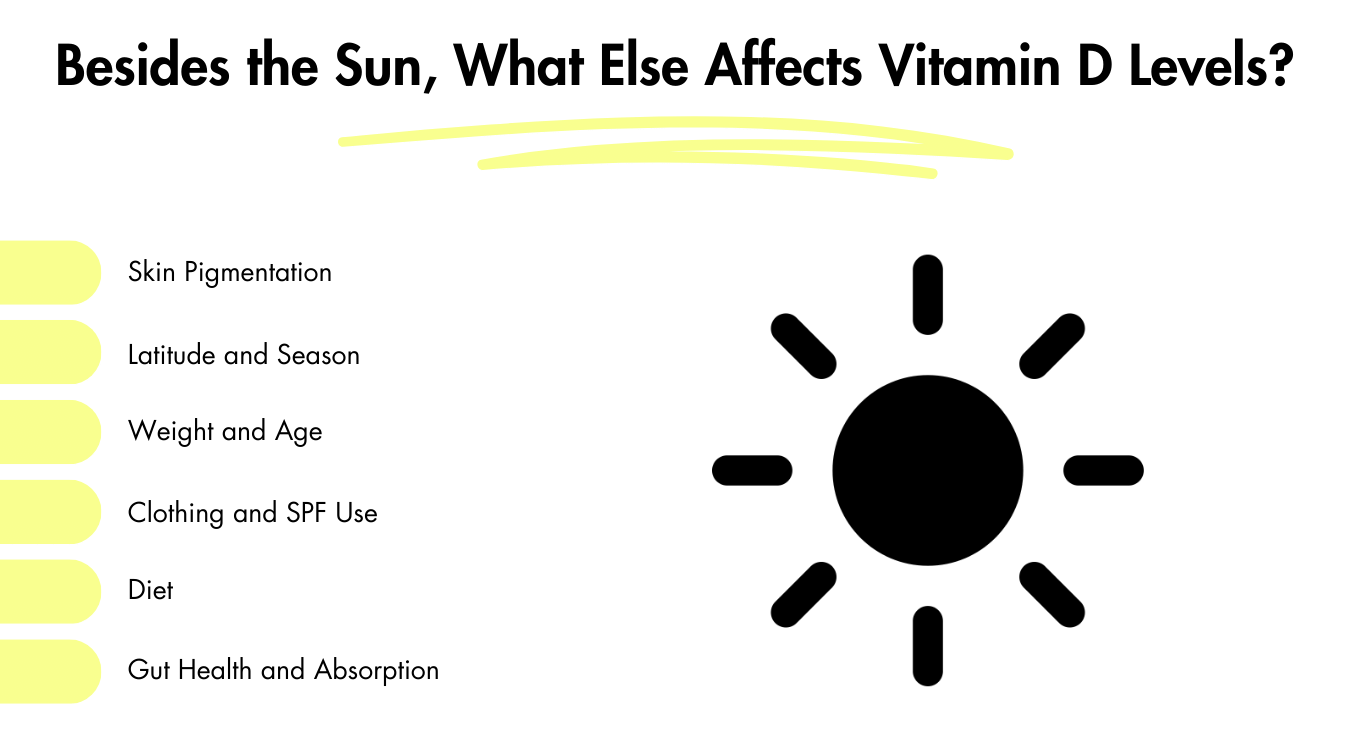
5 Ways You Can Get Vitamin D (Aside From the Sun)
To double down on the D, you may be wondering how else you can the sunshine vitamin apart from just being outside. Here are five ways to get more vitamin D in your life:
- Exercise: Harvard found a link between exercise and your production of vitamin D
- Eat Well: We cover vitamin D-rich foods in the next section – if you want to skip ahead
- Skincare: MOX is formulated with vitamin D3 to boost your skin’s health and look
- Supplement: You should ask your doctor first before taking any new D supplements
- Vitamin D Lamp: Do your research on these before starting, but they mimic sunlight
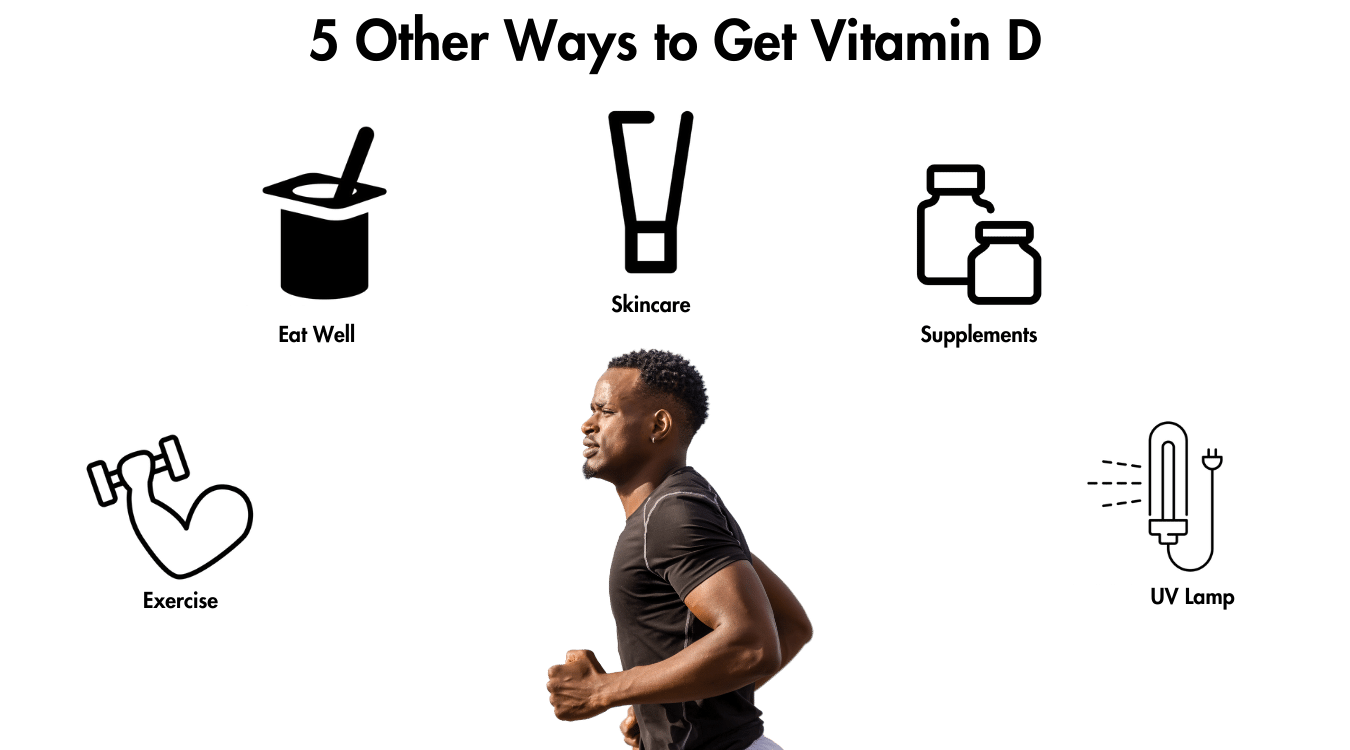
8 Foods Rich in Vitamin D to Add to Your Diet
Food is one of the best things about life – that’s just a fact, so feast your eyes on these vitamin D-rich foods that WebMD recommends adding to your diet ASAP:
- Fatty Fish
- Mushrooms
- Fortified Dairy
- Egg Yolks
- Cod Liver Oil
- Red Meat
- Orange Juice
- Non-Dairy Milk
Vitamin D Deficiency: Symptoms and Quick Facts
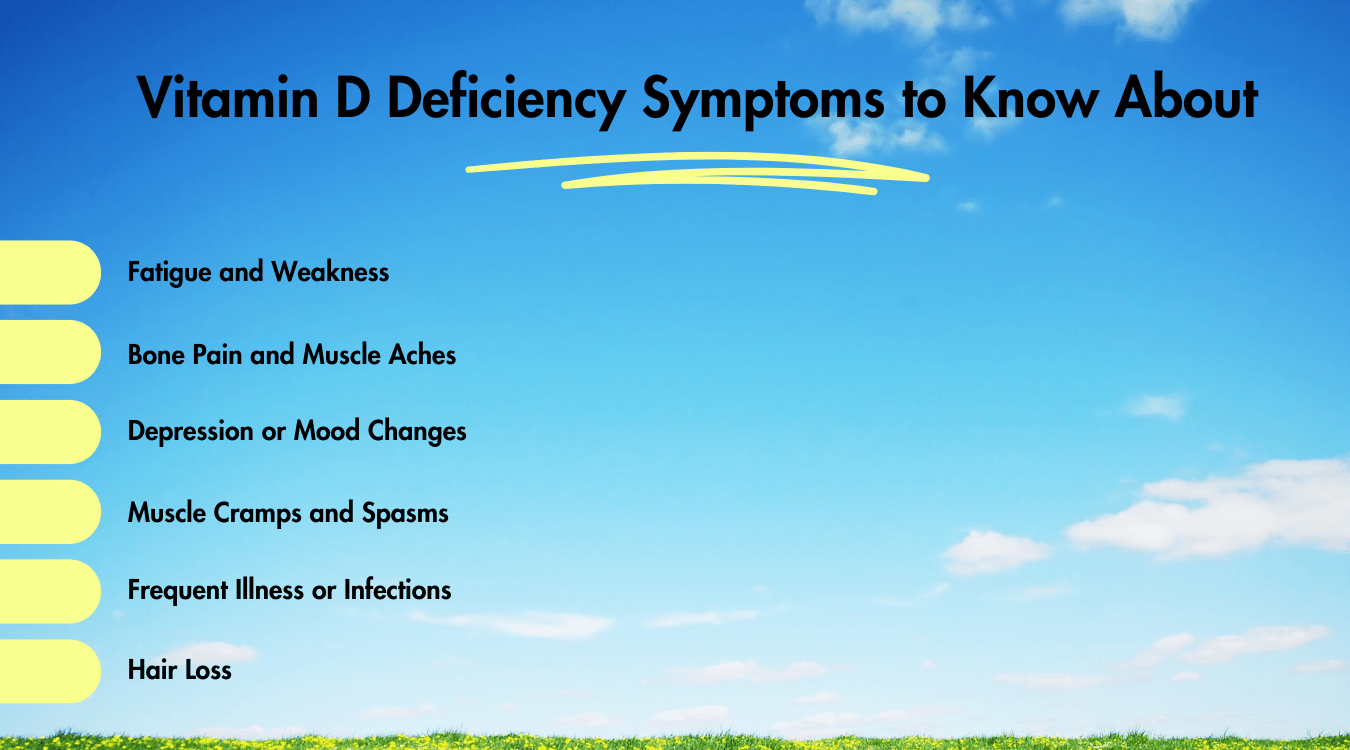
Want to know a fun fact (it’s actually kind of a downer, but you might still be able to use it for trivia one day)? Cleveland Clinic says 1 billion people have a vitamin D deficiency, while 50% of the population has a vitamin D insufficiency.
These are the symptoms of a vitamin D deficiency:
- Fatigue: Feeling excessively tired or lacking energy throughout the day, even after an awesome full night of restful sleep, is a common symptom of a vitamin D deficiency.
- Frequent Illness or Infections: Vitamin D is involved in regulating your immune function, as we said above. A deficiency may lead to more infections or illnesses.
- Depression or Mood Changes: Research suggests a link between low vitamin D levels and mood disorders such as depression, anxiety, and seasonal affective disorder.
- Impaired Wound Healing: Slow wound healing may mean you need some D.
- Hair Loss: While not as common, some individuals with a vitamin D deficiency may experience hair loss or thinning hair as vitamin D supports your overall hair health.
- Bone Deformities in Children: In severe cases of a vitamin D deficiency, children may develop bone deformities such as rickets, characterized by bowed legs, delayed growth, and skeletal abnormalities. You can learn more about this from Mayo Clinic.
- Bone and Muscle Pain: Vitamin D plays a role in calcium absorption and bone health, so a deficiency can cause bone pain, muscle aches, and muscle weakness – which is where the MOX Muscle Roller comes in (shameless name drop, what can we say).
If you think you have a vitamin D deficiency, schedule an appointment to chat with your doctor. They can steer you in the right direction in terms of supplements and how long you should spend outdoors. For now, we made a list of useful vitamin D deficiency resources for you:
- Harvard Health: The Nutrition Source on Vitamin D
- National Institutes of Health: Fact Sheet for Health Professionals on Vitamin D
- Up to Date: Beyond the Basics of a Vitamin D Deficiency
Video: Can you get vitamin D on a cloudy day? What are the symptoms of a vitamin D deficiency? | Source: Brainy Dose
Can You Get Vitamin D on a Cloudy Day? Yes, So Experience the Great Outdoors Confidently with MOX


Do you see that good-looking guy? That’s Simon Rex, MOX co-founder, and big Hollywood star; he says that skincare and taking care of your face matter. Does that mean we’re saying being sexy is connected to using MOX? Yes – we are. Plus, it gives good D (D3 counts too).
Simon also says that you, your bro, your dad, your uncle, and every other dude in your life need the MOX Outdoors Set (the ladies will dig it, too, and for once, might steal your skincare instead of the other way around). Want to know which MOX products the Outdoors Set includes?
- The MOX Invigorating Peppermint Cleanser: Pharmacist Ben says that cleansing is one of the harshest things you do to your skin, especially if you’re doing it twice daily. This next-level cleanser doesn’t dry out or irritate your face like most, can double as a kick-ass shaving cream, and uses salicylic acid to improve skin texture and appearance.
- The MOX Multi Nutrient Serum: Containing the 5 essential vitamins for skin health, vitamins A, C, E, D, and K, this innovative serum builds stronger, healthier skin and more collagen. Pharmacist Ben likes to say that using it is similar to taking your skin to the gym. It’s formulated with non-comedogenic squalane and ultra-powerful vitamin C.
- The MOX Muscle Roller: Do you use anything for muscle discomfort? It’d be a lot cooler if you did, so give ours a go; it’s like a tiny ice bath in a tube because it has an exceptionally powerful formula. Packed with wintergreen, eucalyptus, menthol, and peppermint oil, it’s fast-acting to cool and relax sore muscles for an extended period.
- The MOX Invisible Armor: Using sunscreen is important for an SPF (a sexy protected face – see what we did there?) Ours is a mineral zinc oxide formula that goes on clear but still protects and complements your vitamin D production. Containing hyaluronic acid to help hydrate and soften, along with aloe, you’ll be left with soft skin and no sunburns.
- A Free $25 TOPO Bag: It’s free, cool-looking, and you probably need a toiletries bag.



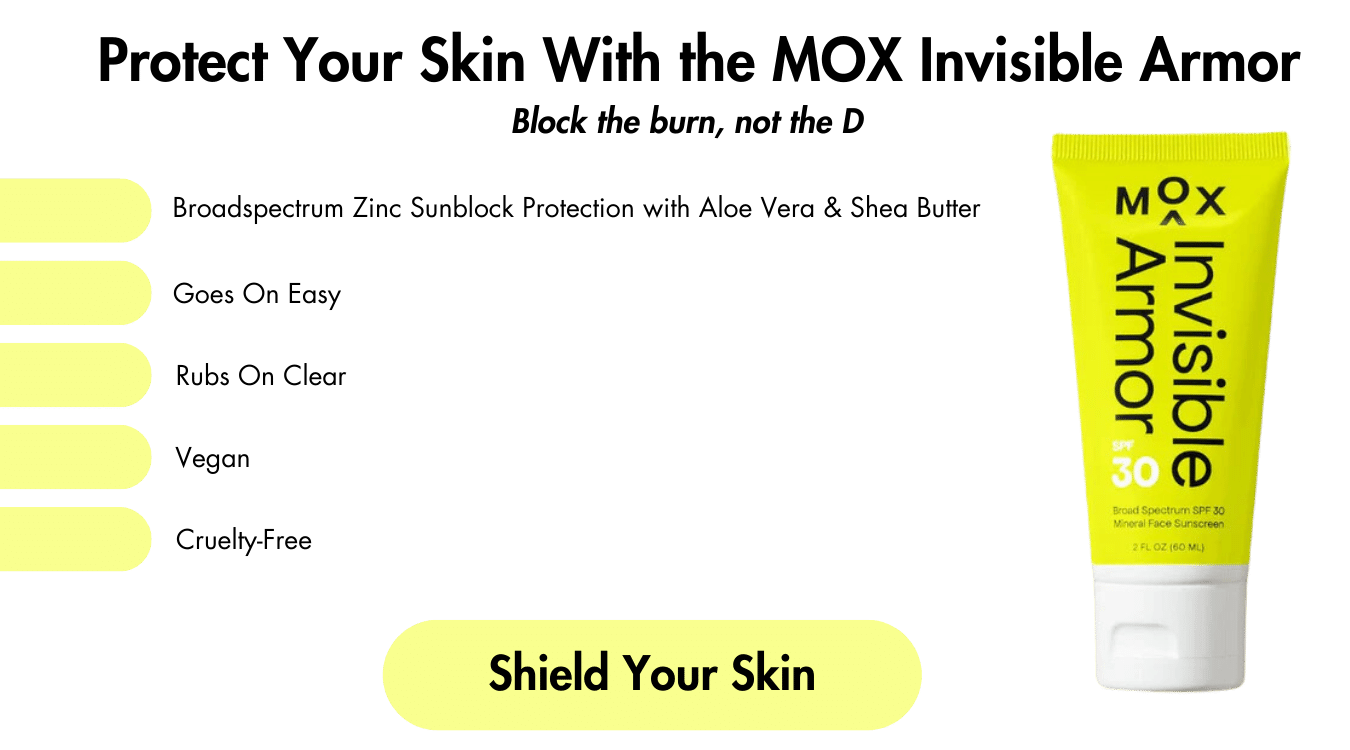

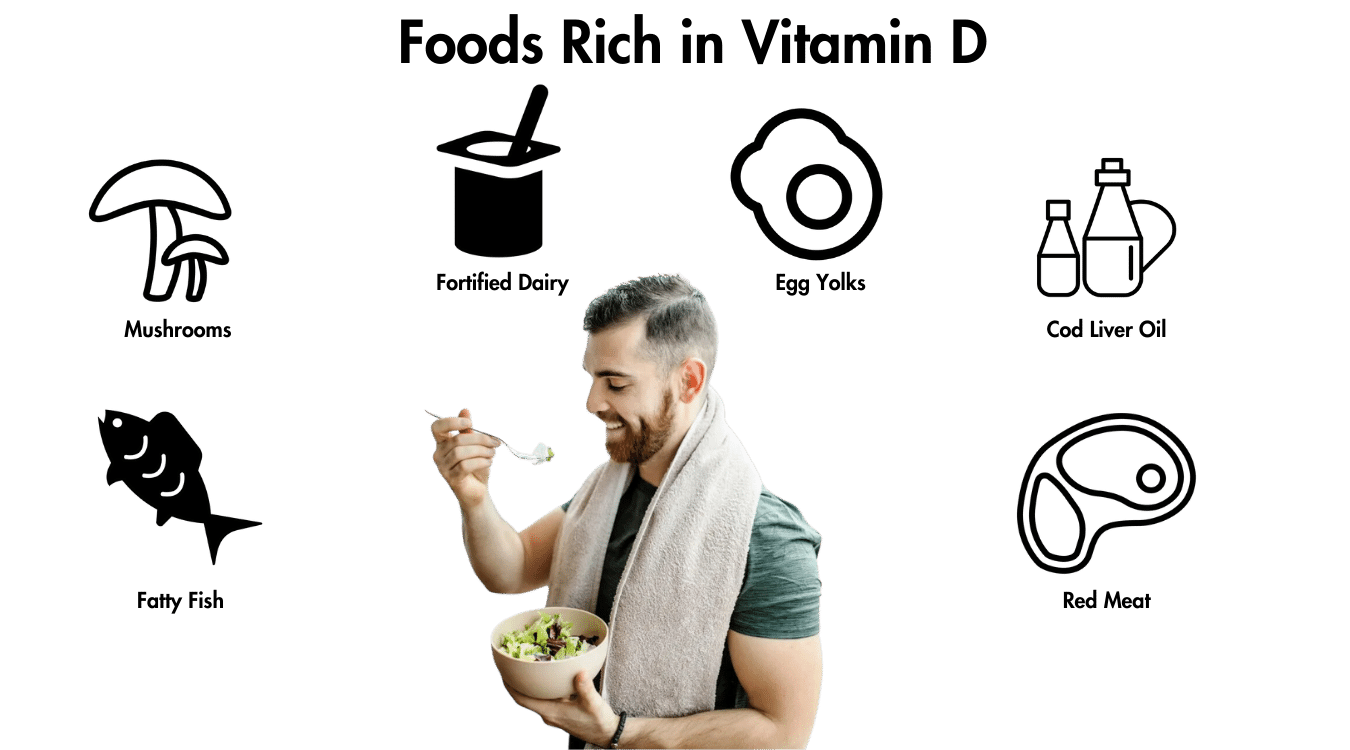
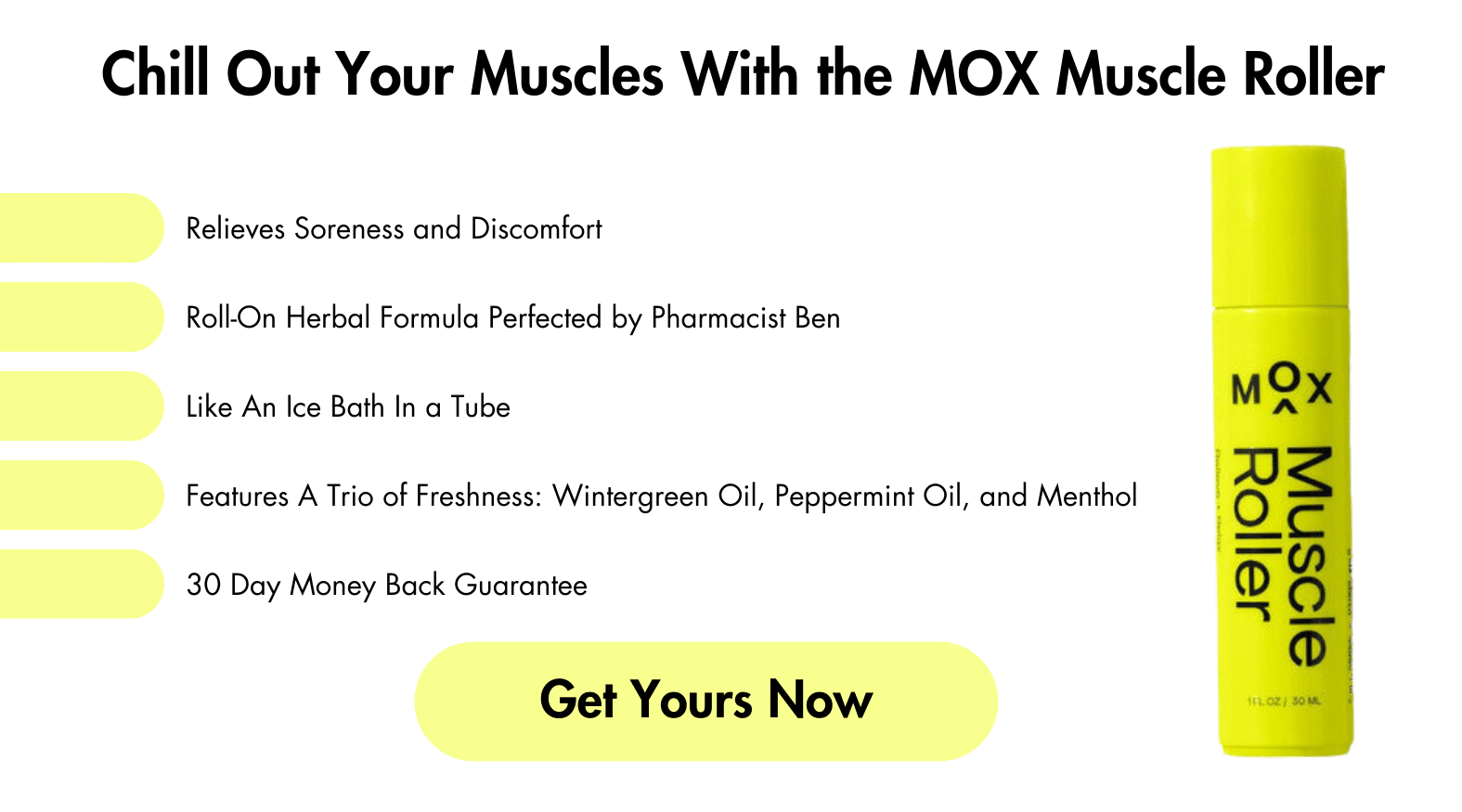

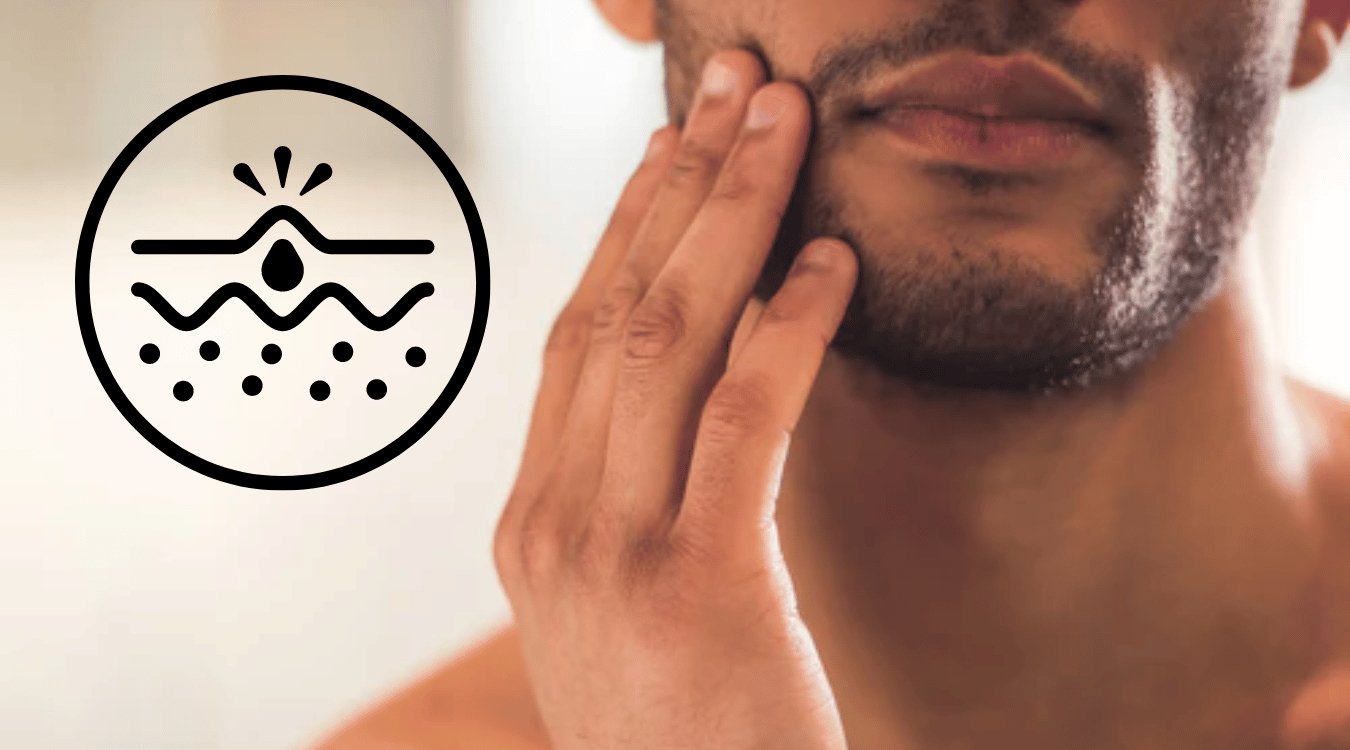

Leave a comment
This site is protected by hCaptcha and the hCaptcha Privacy Policy and Terms of Service apply.